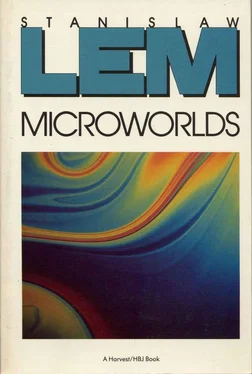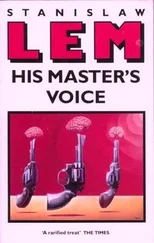That chance played a role in my life is undeniable. In the First World War, when the fortress of Przemysl fell, in 1915, my father, Samuel Lem, a physician in the Austro-Hungarian Army, was taken prisoner by the Russians, and was able to return to Lemberg (now Lvov), his native city, only after nearly five years, in the wake of the chaos of the Russian Revolution. I know from the stories he told us that on at least one occasion he was to be shot by the Reds on the spot for being an officer (and therefore a class enemy). He owed his life to the fact that when he was being led to his execution in a small Ukrainian city he was noticed and recognized from the sidewalk by a Jewish barber from Lemberg who used to shave the military commander in that city and for this reason had free access to him. The barber interceded for my father (who was then not yet my father), and he was allowed to go free, and was able to return to Lemberg and to his fiancée. (This story, made more complex for aesthetic reasons, is to be found in one of the fictitious reviews — of “De Impossibilitate Vitae,” by Cezar Kouska — in my book A Perfect Vacuum. ) In this instance, chance was fate incarnate, for if the barber had happened to pass through that street a minute later my father would have been irrevocably doomed. I heard the tale from him when I was a little boy, at a time when I was unable to think in abstract terms (I may have been ten), and was thus unable to consider the respective merits of the categories of chance and fate.
My father went on to become a respected and rather wealthy physician (a laryngologist) in Lvov. I was born there in 1921. In the rather poor country that Poland was before the Second World War, I lacked nothing. I had a French governess and no end of toys, and for me the world I grew into was something final and stable. But, if that was the case, why did I as a child delight in solitude, and make up the rather curious game that I have described in another book — the novel The High Castle, a book about my early childhood. My game was to transport myself into fictitious worlds, but I did not invent or imagine them in a direct way. Rather, I fabricated masses of important documents when I was in high school in Lvov: certificates; passports; diplomas that conferred upon me riches, high social standing, and secret power, or “full power of authority,” without any limit whatsoever; and permits and coded proofs and cryptograms testifying to the highest rank — all in some other place, in a country not to be found on any map. Did I feel insecure in some way? Threatened? Did this game perhaps spring from some unconscious feeling of danger? I know nothing of any such cause.
I was a good student. Some years after the war, I learned from an older man who had held some position or other in the prewar Polish educational system that when the IQs of all high-school students were tested — it must have been around 1936 or 1937 -mine was over 180, and I was said to have been, in the words of that man, the most intelligent child in southern Poland. (I myself suspected nothing of this sort at the time of the test, for the results were not made known to us.) But this high IQ certainly was of no help in surviving the occupation of the General-gouvernement (to which administrative unit Poland had been reduced by the Germans). During that period, I learned in a very personal, practical way that I was no “Aryan.” I knew that my ancestors were Jews, but I knew nothing of the Mosaic faith and, regrettably, nothing at all of Jewish culture. So it was, strictly speaking, only the Nazi legislation that brought home to me the realization that I had Jewish blood in my veins. We succeeded in evading imprisonment in the ghetto, however. With false papers, my parents and I survived that ordeal.
But, to return to my childhood in prewar Poland, my first reading matter was of a rather curious nature. It was my father’s anatomy books and medical texts, in which I browsed when I was still hardly able to read, and I understood them all the less since my father’s professional books were in German or in French. Only the fiction in his library was in Polish. Pictures of skeletons, of neatly dissected human skulls, of human brains precisely sketched in many colors, of intestines in preserved condition and embellished with magic-sounding Latin names provided my earliest contacts with the world of books. Hunting through my father’s library was, of course, strictly forbidden to me, and it attracted me precisely because it was forbidden and mysterious. I must not forget to mention the actual human bone that was kept behind the glass doors of my father’s bookcase. It was a skull bone — os temporale — that had been removed during a trepanation; perhaps it was a relic from the time when my father was studying medicine. I held this bone, without any particular feelings, several times in my hands. (I had to steal my father’s key to be able to do this.) I knew what it was, but I wasn’t frightened by it. I only wondered about it in a certain way. Its surroundings — the rows of big tomes of medical textbooks — appeared quite natural to me, for a child, lacking any real yardstick, is unable to differentiate between the banal or commonplace and the unusual. That bone — or, rather, its fictional counterpart — is to be found in another novel of mine, Memoirs Found in a Bathtub. In this book, the bone became a whole skull, cleanly dissected from a corpse, that was kept by a doctor in a ward — one of the many stations in the hero’s odyssey through a labyrinthine building. A complete skull like this was owned by my uncle, my mother’s brother, who was also a physician. He was murdered two days after the Wehrmacht marched into Lvov. At that time, several non-Jewish Poles were also killed — mostly university professors — and Tadeusz Boy-Zelenski, one of the best-known Polish writers. They were taken from their apartments during the night and shot.
Now, then, what objective, extrinsic connection — i.e., not one imagined by me and consisting solely of associations — could there be between a little boy’s fascination with the parts of a human skeleton and the era of the Holocaust? Was this apparently significant and fitting omen a matter of chains of chance, purely of coincidence? In my opinion, it was. I do not believe in manifest destiny or predetermination. In lieu of a preestablished harmony, I can well imagine (upon the basis of the experiences of my life) a preestablished disharmony, ending in chaos and madness. In any case, my childhood was certainly peaceful and Arcadian — especially when compared with what happened in the following years.
I grew into a bookworm, and read everything that fell into my hands: the great national poems, novels, popular-science books. (I still remember that a book of the kind that my father gave me as a gift sold for seventy zlotys — the price was written inside -and that was a fortune in those days; for seventy zlotys you could buy a whole suit. My father spoiled me.) I also — I can still remember it — looked with keen interest at the male and female genitalia reproduced in my father’s anatomy books. The female pubis struck me especially — as something spiderlike, not quite nauseating but certainly something that could hardly have a connection with erotic feelings. I believe that I was later, during my adolescence, sexually quite normal. But since my subsequent studies in medicine included gynecology, and since I was, for a month, an obstetrician in a hospital, I associate the pornography of today not with sexual longing and with copulative lust but with the anatomical pictures in the tomes of my father, and with my own gynecological examinations. The thought that a male may be highly excited by the mere sight of female genitalia strikes me as very peculiar. I happen to know perfectly well that this is a case of libido — of the instincts built into our senses and programmed by evolution — but the desire for sex without love strikes me as something comparable to an irresistible urge to eat salt and pepper by the spoonful because dishes without salt and pepper lack full flavor. I feel no repulsion but no attraction, either, as long as there is no specific erotic bond of the kind that is called “love.”
Читать дальше












